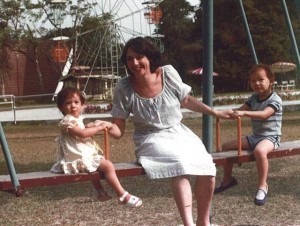 When Anna Wong’s daughter, Nicole, was diagnosed with global delay syndrome, she made it her business to seek out therapies and practitioners who could help.
When Anna Wong’s daughter, Nicole, was diagnosed with global delay syndrome, she made it her business to seek out therapies and practitioners who could help.
With the characteristic determination of a mother on a mission, Anna also set up Senses at Play to market educational toys that help children—especially special needs children—enhance their development in the areas of fine and gross motor skills, language and cognitive abilities.
When you found out about Nicole, how did you feel? What steps did you have to take to deal with the situation?
I had a forceps-assisted delivery with Nicole. She was normal in all areas of development until she was about 10 months old when she started having problems urinating.
Her condition was not properly diagnosed until she was about 18 months old when the doctor had to make a small opening below her belly button so that her urine could drain, saving her further infections and possibly kidney failure.
She recovered after the operation but we noticed that developmentally, she wasn’t on par with other children her age. That was when she was about three years old. We were assured that she would catch up and told not to worry unnecessarily.
However, when she was five, we realised that she was indeed slower than her peers and we decided to send her for a diagnosis. The doctor couldn’t really place a “label” on her but she was motor and speech delayed. And so, we started to send her for occupational and speech therapy sessions.
I am not sure how I felt as I never thought too much about it. Having said that, there are days when I do ask “Why me?” However, because of my Christian faith, I take it as a challege from God, and I know that He will not test me beyond what I am capable of.
From the start, I have been more concerned about Nicole’s well being and how I was going to help her. Thankfully, we have the means as the therapy sessions were long term and quite costly. Besides the core therapy sessions, we also enrolled her for other “enrichment” classes in order to expose her to other activities that may have a positive impact on her development.
School was a big issue. Although I would say that Nicole is a borderline case, she still couldn’t cope in a normal school setting. Having tried and failed in both the government and private schools, I finally enrolled Nicole in a “home-study centre”. I am happy to note that she has finally found her place.
Something like this often puts a great strain on marriages. How has it affected your marriage?
I thank God that my marriage has always been strong and having Nicole has, perhaps, even cemented our relationship further. I take the lead in Nicole’s well being but my husband has always been supportive of my plans for Nicole. He is a good father.
How many special needs children are there in Malaysia? Are they increasing in number?
I do not have any statistics on the number of special children in Malaysia. However, we do “see and hear” of them more often now. Parents are more educated and, thus, if their children are not developing normally, they will seek medical attention. More and more people are seeking help at Nasom (National Autistic Association Of Malaysia) and the Dyslexia Association, which is a good indication that the number of special children is, indeed, increasing.
What kind of support do parents of special needs children have in Malaysia?
Personally, I feel there is very little support for parents with special children in Malaysia. The goverment has started to recognise there is this class of students and has initiated special needs education. There are special classes in selected schools.
However, they only cater to a small number of students and geared towards those who are mild cases. Where do those, like Nicole, go? Besides government schools, some private and international schools also take in special children, on a case-by-case basis.
There are privately run learning centres but most are not regulated. And morever, they only offer Early Intervention Programs where the child is “extensively trained” for normal primary schools. If after spending a couple of years at those centres, the child is still unable to cope, where does he or she go?
There are now an increasing number of NGOs which have set up learning centres as well. These are a welcome relief as the cost is much more affordable. However, again, they only cater to pre-school kids.
For those children who manage primary level work, what happens when they can no longer cope with the secondary syllabus? Existing skills training centres take children from 16 years onwards although there are some that consider 14 year olds. Beyond that, which corporations would hire special needs adults who are able to manage simple tasks?
There is still much to be done. There isn’t an umbrella body to counsel families and teach them to take care of their special needs children. There is nobody to monitor the child’s progress and advise the parents accordingly. I think this is very important and I hope to see someone taking up this mammoth task soon.
Why did you start Senses-at-Play?
It was conceptualised as I found there was a gap in the market—therapy tools and teaching aids were not easily available to parents with special children.
We want to journey with such parents; to empower them with knowledge, and equip their children with the tools that will help them reach their full potential.
Our products include teaching aids, therapy tools, and educational toys and games. We also organise workshops, provide education and counselling for parents and share resources and other vital information.
What message do you have for parents of special needs children?
• Do not delay seeking medical help.
• Start therapy sessions as soon as possible.
• Look for support groups so that you can share your worries, concerns, joys, hopes, etc..
• Change your outlook, change your priorities, change your expectations.
• While your child’s condition will improve, he/she will not be cured.
• Plan for his/her future based on realistic expectations.
• Be strong and positive.
• Don’t be shy to ask for help!
Where can parents of special needs children find support providers in Malaysia?
There is a list of support providers on the Resources page of my website. You can also log onto www.disabilitymalaysia.com which has a rather comprehensive list.
Our Interview series focuses on parents, teachers, role models and children with interesting tales to tell, lives to share and inspiration to give. If you have a suggestion for someone you’d like to see interviewed (including yourself, ahem!), drop us a note at parentingworks AT gmail DOT com to tell us why the person should be featured.








